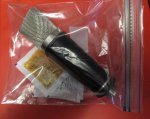madmax25
New member
So I picked up a Rode NT1 (the older model) a month or so ago on eBay. All was well and good and I've recorded with it a few times since. I plugged it in the other day and noticed after about 3-4 minutes it starts making nasty noise, kind of like the "ocean" noises that come out of broken tube amps. Or like the noise floor suddenly goes thru the roof or something.
Anyone have any pointers on what I can do? How to pinpoint where the problem is? If it's a dead cap or something I'm handy with a soldering iron, I just need to know where to look...
Help!
Anyone have any pointers on what I can do? How to pinpoint where the problem is? If it's a dead cap or something I'm handy with a soldering iron, I just need to know where to look...
Help!


 ...
...